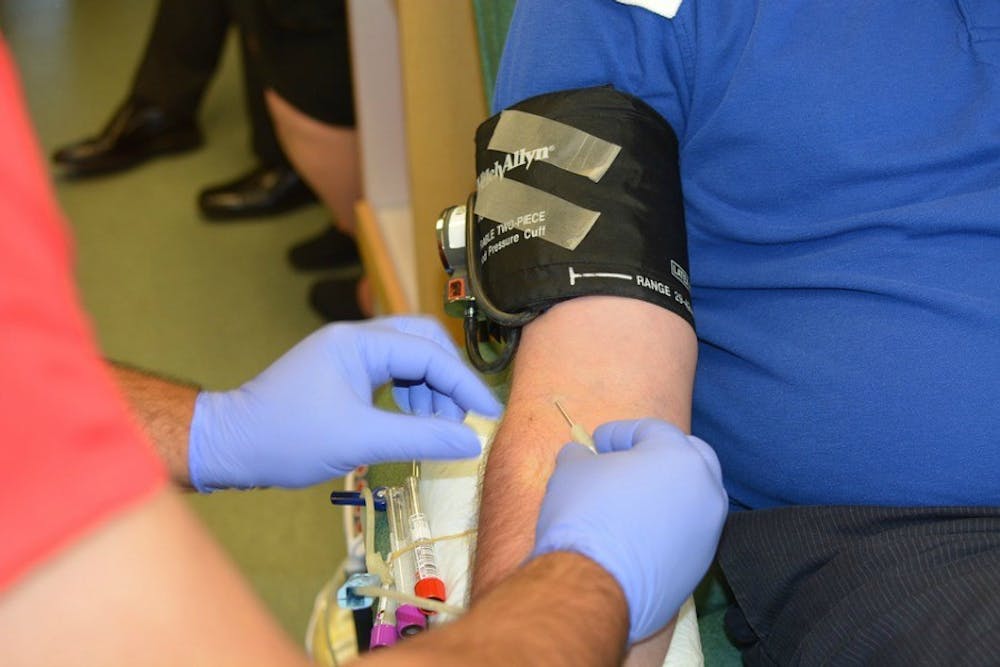The following piece, written by the editorial editors, reflects the majority opinion of the editorial board.
Next Tuesday, April 25, Community Blood Center will hold a blood drive in Shriver Center from 11 a.m. to 6 p.m. Donating blood offers a rare opportunity to save lives at the small asking price of a pint of blood. If you are eligible and willing to donate, we certainly encourage participation.
Eligibility for donation seems like it should be fairly straightforward. If you weigh too little, have issues regarding iron-concentration in your blood or have recently received a tattoo from an unregulated parlor, you cannot donate due to safety precautions. You put yourself in harm's way if your body cannot withstand the loss of blood, and you put others in danger if your blood is infectious. These restrictions are clear, no doubt about it.
Alas, there is but one restriction that must be corrected and not just simply modified. According to the American Red Cross, a December 21, 2015 amendment by the FDA reduced the deferral to donate for "Men Who Have Had Sex With Men (MSM)" from a lifetime deferral to a one-year deferral. There's the modification, a change that pales in comparison to another significant change in 2015 - that of legal same-sex marriage throughout the nation.
How is it that, after a landmark decision freed same-sex partners from the shackles of the law, something as discriminatory as the MSM deferral could still exist?
This original restriction, of course, is based on the assumption that HIV/AIDS can be contracted solely by men who have sex with other men, a falsity not worth discussing.
The reduction from a lifetime ban for donation to one year seems progressive on the surface, only it leaves one wondering why such a ban should exist at all? If, after having sex with another man, the man in question contracted HIV/AIDS, his condition would not simply disappear after a year-long hiatus from homosexual intercourse - rather, the condition is indefinite.
Again, donating would be a hazard for those on the receiving end - that is, if your blood was somehow able to slip through the grasps of those handling it and go unscreened for such diseases, which should never occur.
Similarly, a one-year deferral period would be meaningless for any gay man in a relationship with another man, as no one would expect such a person to remain sexually abstinent for an entire year simply to donate blood. The fact that a sexually responsible gay man cannot donate blood while a promiscuous straight person can is beyond reason
The only logical assumption as to the reason for this ban, then, is discrimination. Some, in order to elude this discrimination, simply mark that they have not had sex with a man in the last year on the questionnaire and proceed to donate their blood, regardless of their honesty.
One such case was admitted in an anonymous letter run in The Student on October 13, 2015 in which a student stated why he donates blood while marking "no" for that question. He concluded the letter in an uplifting manner, writing, "I highly encourage anyone who is physically able to give blood, regardless of your sexuality."
We do not condone lying in order to donate blood, but, at the same time, gay men should not be put in a situation in which they have to lie.
We are living in a time in which tens of thousands of units of blood are needed each year to treat patients with conditions like cancer, sickle cell and traumatic accidents such as car crashes.
However, despite the fact the 38 percent of the U.S. population is eligible to donate blood, only about 10 percent of the population does, according to the American Red Cross. Thus, it is imperative that we encourage as many people as possible to donate in order to save the maximum amount of lives that we can.
We don't want to follow in the path of North Carolina state legislature. Additionally, we don't want to give in to the fear that plagued the country in the wake of the HIV/AIDS epidemic that exploded in the media in the 1980s. This disease can afflict anyone, and creating a blanket rule for one group of people produces a net loss for an otherwise noble cause.
One blood donation has the potential to save multiple lives when tragedy strikes. No one should have to die because of an outdated, discriminatory policy.

